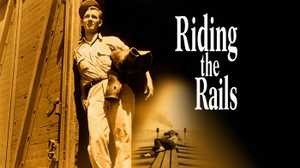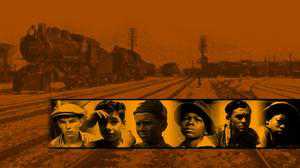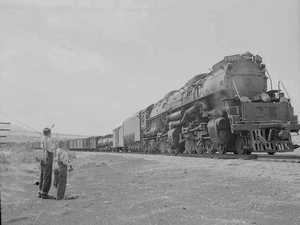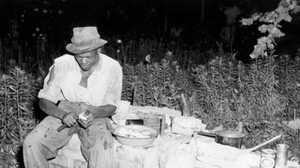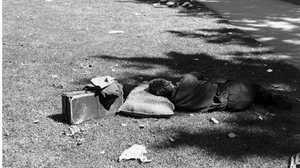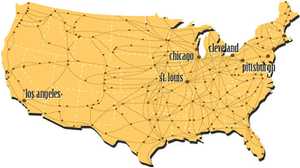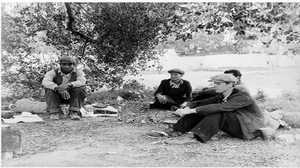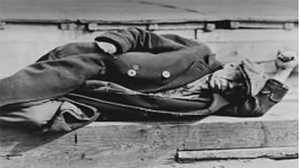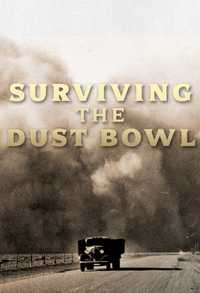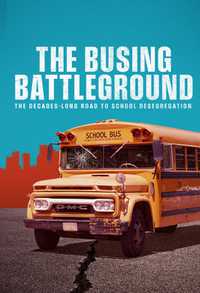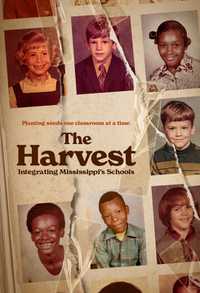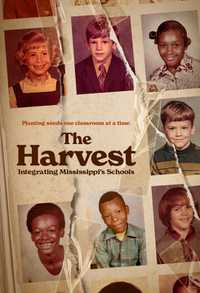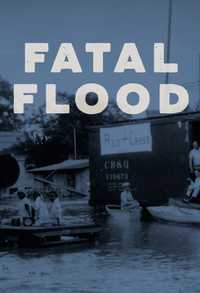Jim Mitchell, left Wisconsin home in 1933 at age 16: We thought it was the magic carpet, you know, romance, the click of the rails.
René Champion, emigrated from France in 1929, left Pennsylvania home in 1937 at age 16: And the sound of the whistle, the mournful sound of the train, it really pulls you.
James San Jule, left Oklahoma home in 1930 at age 17: I was running into something that I thought was adventure. For the next couple of years, I was a homeless kid riding freight trains.
John Fawcett, left West Virginia home in 1936 at age 16: 1935, I expect it was. I was only 16 years old.
Peggy De Hart, left Wyoming home in 1938 at age 15: I was 15 years old. I was real excited. I had two dollars and a half in my pocket.
René Champion, emigrated from France in 1929, left Pennsylvania home in 1937 at age 16: I was young, I was 16 when I started. I was also well-brought up.
Guitar Whitey, Bob "Guitar Whitey" Symmonds, left Washington home in 1938 at age 16: One day when school got out, it was the month of June, in 1934, me and another guy caught our first train out. There was about twenty guys in the boxcar and they had to help us up 'cause I couldn't even reach the floor.
Narrator: At the height of the Great Depression, there were 250,000 teenagers living on the road in America. The country's economic collapse had destroyed everything in their young lives. Their fathers had lost their jobs; they'd been evicted from their homes, even their schools went bankrupt and closed their doors. Like millions of adults roaming the country between 1929 and 1941, thousands and thousands of boys and girls left home in search of a better life. This is the story of why they left, how they struggled to survive, and how their experiences shaped their lives.
Jim Mitchell, left Wisconsin home in 1933 at age 16: I remember the morning it happened. I was working down in my shop before going to school. My dad came home and it seemed strange. The first time in my life I ever saw my father cry. And he said, "I lost my job." He says "I don't have any work." And, well, that was devastating.
I mean, 'cause they had now stripped him of his pride. Even though he was nothing but - he put pieces of metal in a machine that went clunk and that's it, that's what my dad did. But he had his pride and he wanted to take care of his family, and it was getting so he couldn't, he couldn't. And so as far as I was concerned, it weighed in on you, and it bore down on you so hard, you said, "the hell with it, I'm gonna get out of here." And the quickest and easiest way to get out was go and jump a train and go somewhere.
And I left a little note on the pillow and I said "I'll write."
Clarence Lee, left Louisiana home in 1929 at age 16: I wanted to stay home and fight that poverty with the family. But my father told me I had to leave. It was very hurting, very badly, but I - he meant I had to go. But I didn't have it in my mind to leave until he told me, "Go fend for yourself. I cannot afford to have you around any longer."
René Champion, emigrated from France in 1929, left Pennsylvania home in 1937 at age 16: I was raised in what would be called today a dysfunctional home. I was frequently beaten, beaten up for things which today would mark me or make me be considered as a battered child.
But I must say also that I've always had kind of a yen for wandering and I think it was a combination of my unhappiness at home plus this desire to roam. Both of those things are the things that drove me to my hoboing.
Peggy De Hart, left Wyoming home in 1938 at age 15: I was helping my dad milk and I was getting pretty cocky, I thought as long as I had to work like a man, I ought to be able to talk like one. And, so I snuggled up to my cow one night on my T-shaped stool and started to milk her and she swatted me in the eye with her dirty tail and I got up and whopped her one with my stool and cussed her out and my daddy came across that aisle like a wind and hit me up one side of the face and down the other and said, "Don't ever let me hear you talk like that again." And I said, "I'll leave home." And he said, "You'll be back for supper."
And there was this girl called Irene Willis and she wanted to go to Issaquah to see her parents and she was going to hitch-hike so she asked me to come along. And I thought that was a great idea considering the conversation I'd had with my dad.
Commissioner Hudson (archival): And now Clive, tell us about yourself.
Clive (archival): Well, I'm from South Dakota and my home is in Rapid City, a very small town, and I've got a girlfriend there and the reason I'm in this large city is because she turned me down because I didn't have a job to show her good times and she turned to someone that could.
Commissioner Hudson (archival): And now Charlie will you tell us where you came from and how you got here and what your purpose was in coming?
Charlie (archival): Well, I came from Louisville, Kentucky, came on a freight train, and for adventure.
Commissioner Hudson (archival): For adventure? Most everybody that I know of that comes here is looking for a job.
Charlie (archival): Well, I'm different.
John Fawcett, left West Virginia home in 1936 at age 16: I ran away from home three different times and I always left a note on my dad's desk in his study, telling him not to worry.
My dad was the doctor, so in the Great Depression years, you know, I didn't even hardly know there was such a thing because we never had it hard. I certainly didn't run away from home because of home life. I just ran away from home - why do boys run away from home? For adventure, I guess...
Charley Bull, left California home in 1930 at age 19: You couldn't catch the freight train usually in the yard unless it was real late at night and you spotted where the bulls were, that's the railroad police, and if you knew that they weren't on your trail, you could catch one slowly as the train was moving out of the yard. But generally speaking, you have to go just outside the yard, therefore you have to catch the train on the run.
Peggy De Hart, left Wyoming home in 1938 at age 15: Detectives - the railroad detectives - were patrolling with lanterns and a rifle up and down the tracks. But when that train started and it gave a - you know it always jerks loose and when it did that, this whole group of men just rose up like one person and rushed to that one door.
Charley Bull, left California home in 1930 at age 19: You're running along and trying to match your speed with the speed of the train and you get a hand-hold here first and you swing yourself around and you're still running and you get two hand-holds. Then is the first time you lift your foot.
Peggy De Hart, left Wyoming home in 1938 at age 15: And I was the first one there and somebody grabbed me by the nape of the neck and the seat of the pants and pitched me into that thing.
Clarence Lee, left Louisiana home in 1929 at age 16: It was a good feelin' to be on one, really, with that cluck, cluck, cluck, cluck, you hear that sound as you go. And the shakin'of it you know, and the cluck sound with the wheels hittin' those joints. That's one of the things that I always thinks about. You gonna feel good just to hear that train, the whistle blow, you feel good when you get on it, you know. 'Cause you didn't have to walk, you just gonna get there, and you gonna try to better yourself.
Narrator: By the early 1930's, riding the rails became an epidemic, even though it was dangerous and illegal. In 1932, the Southern Pacific Railroad threw half a million transients off their boxcars, many of them teenagers.
In 1933, Warner Brothers produced the movie Wild Boys of the Road, warning young people about the dangers of riding freights.
Kids scream (film): "Tommy!"
Guitar Whitey, Bob "Guitar Whitey" Symmonds, left Washington home in 1938 at age 16:Well I think Wild Boys of the Road, kids loved that movie. If you see a movie like that showin' kids traveling on trains, well that put the idea in your head, 'Well I could do that too. I wouldn't mind doin' that. I'm not gonna get my leg cut off like that kid did in the movie.'
And like they say, you ride a freight train one time and you're hooked and I became an addict.
Guitar Whitey, Bob "Guitar Whitey" Symmonds, left Washington home in 1938 at age 16 (singing): Well I haven't got a nickel, not a penny can I show. Get off, get off you railroad bum, and he slammed that boxcar door. He put me off in Texas...
Guitar Whitey, Bob "Guitar Whitey" Symmonds, left Washington home in 1938 at age 16: I nearly was killed on my very first train ride. As it picked up speed, the plank started to vibrate like a spring board throwing us up in the air and all we had to do was hang onto that one grab iron. And she was going faster and faster. And all I could think of was, "I shouldn't have got on this train. If I lose my grip I'm gonna die." And "What will my mother think?"
Peggy De Hart, left Wyoming home in 1938 at age 15: It was absolutely full of men, we were the only women. And it was evening, the sun was just setting. We sat down in the door and I was swinging my legs and Slim slapped my shins and said, "Hey, keep your feet down or you'll be jerked off by a switch, can jerk you right off into eternity."
Charley Bull, left California home in 1930 at age 19: You could ride on top of a freight car and then you just had to be careful. If a train is going sixty or seventy miles an hour and hits a curve and you're walking and your back's to the turn and you don't see it coming - a little tiny turn can throw you right off the train. A lot of people have been killed like that, they don't know.
John Fawcett, left West Virginia home in 1936 at age 16: It was 6 below 0 when I ran away from home the first time. I can only imagine how my mother felt, you know.
Jim Mitchell, left Wisconsin home in 1933 at age 16: Hell, I don't think I was twenty miles down the road, riding in the blind of the car and it was cold and miserable. Hell, I knew right then I had made a mistake.
Narrator: Being on a freight was full of unforeseen miseries. In one moment, hobos could be thrown off a moving train by armed railroad detectives. In the next, they could be suffocated by the smoke trapped in a tunnel, as one survivor, Maurice Ayers, recalled.
Narrator (reading letter): "I looked up to see the train enter a tunnel. The smoke overwhelmed me and I couldn't breathe. I panicked and crawled to the top of a boxcar. When I came to, the train had stopped at a water tank. I was violently sick, coughing up black coal smoke. I coughed it up for a year afterwards."
John Fawcett, left West Virginia home in 1936 at age 16: It was around midnight when our train pulled into the big passenger station, Ann Street Station in Parkersburg, West Virginia. And the train hadn't even stopped, and there was a gun and a flashlight in my face, right up there in the blinds. And so, the bull took us- told us to get down off there onto the platform and he took us, one in each arm, and walked us down the station platform and all these people getting on and off the trains. And I don't remember ever being so humiliated. This is at midnight. And in ten minutes, why, we were behind bars.
My first impression was the awful odor and stink. "The brute" as they call him was the man - most jails are like that - there's one person that runs the jail and Mick and I were both brought into his cell the day after we got in and we had to strip down, take our clothes off, prove to "the brute" that we didn't have any money belt or something like that. And he asked us if we had any money. And we said, "Well yeah, we did" because by that time we were scared to do anything else. So he says, "Okay, take off your shoes and let's have it." So anyway, that's where our six dollars went to.
Peggy De Hart, left Wyoming home in 1938 at age 15: Napa, Idaho, August 3rd, 1938. Dearest Mom, just a line to let you know I'm okay. The police picked up Rene and I last night and put us in a cell. We sure made use of the cots. I hope they turn us loose soon so that we can go again. This is the third time they've picked us up. They all think we are runaways. Fooled, eh what? Love and kisses, Peggy Eaton.
Narrator: Sleeping in jails and avoiding the bulls was a rough existence. And some runaways went back home when they'd had enough. But this option could run out when the Depression caught up with their families.
Guitar Whitey, Bob "Guitar Whitey" Symmonds, left Washington home in 1938 at age 16: My father had a security business where he sold stocks and bonds and things and he was doin' real well up until about 1938, at which time he lost everything - and lost his business, couldn't even keep his house going or anything so my aunt let us live in a little cabin up in the hills rent-free while my father was trying to start another business, which he never did do. He never earned another dime as long as he lived. And so we went from middle-class gentility right down to scrabble-ass poor. Overnight. And I was the logical bread-winner, so I had to go out on the fruit tramp and ride freight trains and earn a little money.
Narrator: Teenagers who were new to the road had high hopes about where their journeys would lead them. Some tried to earn a little money and send it home. For others, riding the rails was a passport to adventure. The freights would take them out West where they would become cowboys, or to the big cities where they would ship out and see the world.
James San Jule, left Oklahoma home in 1930 at age 17: I was seventeen years old. My adventurous mind said "I want to ship out." I read all kinds of exciting books about people who did that - Richard Halliburton or Ross Simpson, and some others. And I tried to get a ship out of New York.
Commissioner Hudson (archival): One of the very unfortunate things in connection with the Depression is the fact that so many people have left their homes to look for jobs in other places.
My advice to all everywhere is not to come to New York. There aren't enough jobs here to go around and it is very much better for all to remain in their own homes with their own friends and with those who can help them in their time of trouble and distress.
James San Jule, left Oklahoma home in 1930 at age 17: I never did ship out. And I lived down in a subway kiosk for four months, stole food from the Washington Market. This was the days of Herbert Hoover. Young people had no support whatsoever, none, zero. You were totally 100% on your own.
Narrator: Homeless and without jobs, kids who came to the cities had to turn to the missions or the Salvation Army.
Jim Mitchell, left Wisconsin home in 1933 at age 16: These missions were a place to get a free meal and some of them even had a place where you could sleep for the night so long as you sat through the sermon, you know. You sort of felt ashamed in a way 'cause I was going there because I wanted something to eat and they were preaching to me 'cause they wanted to save my soul, which probably needed saving.
Narrator: City missions and relief agencies were overwhelmed by the number of young transients coming to them for help. In an effort to send teenagers back home, the authorities were tougher on them than they were on older transients. Relief stations gave adults six meals and two nights' lodging, but a teenager only got two meals and one night's lodging.
Clarence Lee, left Louisiana home in 1929 at age 16: You didn't know where you was gonna find a job. You'd say, 'Well, I'll go to such and such a place, I'll get a job.' That was just out, you just didn't - people just be walking just like cattle, you could see them - heads bouncin' along - goin' out tryin' to look for jobs and there wasn't any.
Narrator: City relief was so inadequate that most kids preferred to stay on the move between small towns, relying on the charity of farmers and housewives. Drifting into the hobo life.
Guitar Whitey, Bob "Guitar Whitey" Symmonds, left Washington home in 1938 at age 16: You had to really be on the bum, asking at back doors for handouts. And a handout was somethin' they would give to ya in a sack to take you know, they called it a "lump" also and a "knee-shaker" is when you would sit down on the back porch and they'd bring ya a tray of sandwiches or somethin' to eat and a "sit-down" was when they'd ask you to come in and you could eat with the family.
Clarence Lee, left Louisiana home in 1929 at age 16: If they was white kids, they fared better. If it was black ones, you did not. Some of them would turn you down and some of them didn't want you on their premises to go ask for nothin'. But a white one was treated much better. They might let them stay in a house with them, but me, I could sleep in a barn with the mules and hay.
John Fawcett, left West Virginia home in 1936 at age 16: You know I was hungry all the time, and I wasn't used to hunger, you know. I'd never been hungry before, dreadfully hungry, you know. Sometimes two and three days without anything to eat. Nothing, you know.
Getting food from a restaurant, there's kind of a technique you learn, you go walk back and forth in front of a restaurant or cafe and look for a man on a stool, usually at a counter, and you buzz right in there and speak right up to the waitress and give them the story, you know, "Have you got any work to do in exchange for something to eat?" And if you do get turned down, one or the other of these people that's beside you, there's a chance they will pipe up and say, "It's okay, lady, give the man his breakfast" or "give him a cup of coffee and I'll pay for it." And, then you're home free for the time, you know.
Jim Mitchell, left Wisconsin home in 1933 at age 16: You'd start talking with kids, kids your age, sometimes you'd start talking with them. I was cutting the lawn once and there was a perfectly nice girl, you know and I started talking with her and her mother called her away. Boy, that really hurt, you know 'cause I, listen, I'm as good as she - you know or anybody, you know. I'm not a bum. But after a while, people would let you know that you were a bum, you know, and so...
René Champion, emigrated from France in 1929, left Pennsylvania home in 1937 at age 16: You don't establish relationships. Certainly not with women. The women in the towns where hobos passed through just didn't want to have anything to do with them; we were viewed as bums. We smelled like bums, we looked like bums, we were dressed like bums.
Narrator: Towns which were struggling to take care of their own residents could be actively hostile to hobos.
Young transients hoped they did not get injured or sick in places like Weatherford, Texas, whose local policy was to deny them medical help. Instead, they were driven several miles out of town and dumped on the highway.
Clarence Lee, left Louisiana home in 1929 at age 16: My worst fears was bein' shot by some farmer who didn't want you around. Because if dark catch you and you on their property they just might shoot you.
Narrator: For African Americans, traveling in the South was especially dangerous. Lynchings were still considered part of local justice by many southern whites, and a young black transient could suddenly find himself in deep trouble.
Clarence Lee, left Louisiana home in 1929 at age 16: I was leavin' from Baton Rouge to go to Denham Springs, Louisiana, and this man made one stop in between at a small station place and somebody got on the train and was talking to the conductor and he says, "Well, that boy has to be put off here. They're goin' to lynch him. See there has been a rape between here and Denham Springs, see and he fits the description." So, he put me off, right in the middle of the swamp. Probably saved my life.
Narrator: Being a homeless migrant was considered a crime in itself. Vagrancy was punishable by prison or hard labor.
To avoid being arrested, young transients slept in temporary camps set up by hobos along the outskirts of towns. The camps were known as "jungles."
Guitar Whitey, Bob "Guitar Whitey" Symmonds, left Washington home in 1938 at age 16: A jungle is just a little transitory place where you can camp while you're waiting for your train.
And they were in little groves of trees where somebody would be sitting over a fire or maybe had his bedroll out and up in the branches of trees would be hanging things like mirrors so you could shave. And sometimes even razors.
John Fawcett, left West Virginia home in 1936 at age 16: Quite often in hobo jungles, there's residents in there, old jungle buzzards as we used to call them, that lived there for weeks or months at a time. And, you quite often get permission from them if you want to do something. "Hey, I want to wash my clothes. Is that okay down there?" And he'd say, "Yeah, well, go downtown and bring us back some cabbage and then you can do whatever you want and you can have some of the Mulligan tonight." That's the way it worked.
Charley Bull, left California home in 1930 at age 19: I was usually assigned the job of bringing the money thing. I had to go and offer to work at the Safeway store. And the man would say, "Well yeah, you can come and clean up out here where the trash is and clean all this up," and he says, "What do you want?" And I said, "Well if possible sir, I'd like to get a can of coffee." He said, "Okay, okay. You clean all that up." I said, "We need a can of condensed milk, too, and maybe a pound of sugar." He said, "Well, alright, alright, alright." And so, you know, it was almost tantamount to begging, but I would tell him what we really needed and he would find enough work for an hour or two for me and I would come home with the coffee.
Inquiring Cameraman (archival): Now we're going to give you a real inside view, an actual interview in a genuine hobo jungle. You fellows come a long way?
Hobos (archival): "Yeah."
Inquiring Cameraman (archival): Where you from?
Hobos (archival): Texas. Texas. Washington. Pennsylvania. Montana. New Jersey. New York.
Inquiring Cameraman (archival): What are you doing out here, bud?
Hobo (archival): That's my business, partner.
Inquiring Cameraman (archival): How 'bout you?
Hobo (archival): Special invitation out here.
Hobo (archival): Out here for the climate.
Inquiring Cameraman (archival): What about you, son?
Hobo (archival): I'm just riding.
Narrator: Jungles offered shelter, but many recall how dangerous they were for young travelers.
Narrator (reading letter): "These three fellas started working a con game so I told them to leave us alone. One of them jumped up and gouged me with a big, long pocket knife and then they took off. If the wound in my chest had been a quarter of an inch deeper I would have died right there. Ben Fowler."
Narrator (reading letter): This camp had two or three old men with their "boys" and they waited on the boys hand and foot just like they were queens. I being young and off the farm was approached by them a number of times. Keith Weaver."
Narrator (reading letter): It was a time when a man could get killed for the shoes he wore, no matter what condition they were in. Gillson Tallentire."
John Fawcett, left West Virginia home in 1936 at age 16: It didn't matter which direction the train was going. Just because the guys in the jungle tell you one night "No use going back east to Minneapolis, man I just came there was from there, there's nothing there." But when that train came by there was people got on and went back there, because you feel like when you're in those kind of desperate straits that anything is better than just sitting in the jungle, complaining or getting hungrier. You got to get out and move.
Narrator: Teenagers who traveled through Depression-era America saw a country in turmoil. For many, it was a brutal education.
Jim Mitchell, left Wisconsin home in 1933 at age 16: Probably the most devastating thing was seeing whole families travel. We ran into a family once, there was a mother and two or three children. And we found out that just a couple days before, the father had been killed about two hundred miles down the road. He was- they had gotten onto the boxcar and he was trying to get on and he slipped and fell. And this poor man was killed and his family was all alone and she was goodness heading for where.
John Fawcett, left West Virginia home in 1936 at age 16: Some of them were awful looking, I mean in real terrible condition, because there's a lot of people on the road that were dreadfully near starvation. Okie families dispossessed from their farms, you know, in the Midwest.
Narrator: The Depression and the terrible drought of the Dust Bowl had forced four million people onto the road. Young hobos swelled this growing army of migrants looking for seasonal work. Most headed west to California.
Guitar Whitey, Bob "Guitar Whitey" Symmonds, left Washington home in 1938 at age 16: It was all Okies, Arkies, Texans, and whoever, you know. We'd start in strawberries and work clear on through apples, and beans, hoeing hops, all kinds of things 'til potatoes in the fall down in Tule Lake, California, and end up shaking walnuts. So, we'd run the whole gamut, maybe six or seven months and then I would have had enough money to buy groceries to see the family through the winter.
Narrator: Young people looking for work had several strikes against them. They were inexperienced, and faced competition from adults who often had children of their own to support. And young migrants were usually paid less than adults for the same work.
Clarence Lee, left Louisiana home in 1929 at age 16: I was doin' man's labor, not child's labor. And I had somebody at home I was thinkin' about tryin' to go back and help. I figured I was a man. 'Cause I was helpin' to put somethin' on the table before I put my feet under the table.
Narrator: The Depression pushed prices so low that some crops were almost worthless. Young workers learned how desperate their employers were when they tried to collect their wages.
Narrator (reading letter): "Once I worked for man who wanted me to unload a coal car. I stood up there and threw down the coal. I worked all day. He gave me two tomatoes. In South Dakota I worked all day in a wheat field. End of the day the farmer handed me 15 cents. I gave it back to him. Told him if that's all he could give me for a day's work, then he should keep it because he must need it worse than me. George Rhoads."
John Fawcett, left West Virginia home in 1936 at age 16: I rode the freight trains to Little Rock and then I had to walk all the way from Little Rock to Marshall, Arkansas - about a hundred miles. I got a couple short rides by hitchhiking. But, I want to tell you about Marshall, Arkansas, if I can do it justice. Because it was a small, Ozark mountain town of maybe a thousand or more, but it was a county seat with a courthouse in the middle and a block away you're out in the country again. And I spent the whole day just standing around that town square, listening to people talk, mostly farmers in overalls, poor hard scrabble farmers just hearing how life was like for people on the real edge.
They talked about how tough life was and I had never heard people like that talk and what they talked about. I was hearing about conditions in the country that seemed to me to be very awful, but I was hearing it from the people themselves, not from guys that were disconnected from society like hobos, who weren't home anymore, and maybe were just exaggerating, these people were talking about the way things are, and I think that had more impression on me than anything else on that trip in that this was true. This is the way life is for people.
Jim Mitchell, left Wisconsin home in 1933 at age 16: I ran into two types. One that firmly believed in the American system. By God, this is gonna work and the others were, honest to God, I swear, Marxist Revolutionaries. They wanted to start the revolution now. I was a kid, I didn't quite understand, I sort of knew a little, it was later on it all started to sink in. We don't want to overlook the fact that this country was on the brink of hell. We were looking and searching for anything to get us out of this mess. Communism looked very, very attractive to people. I mean, we are going to share everything and we are all going to be one great big happy family. It was a lot of baloney, we weren't, but we believed it.
John Fawcett, left West Virginia home in 1936 at age 16: Either on the trains or in jungles, you do get to talking about what this means in a broader sense, the social struggle. Why does it have to be this way? I can remember being aware of the difference between the working class and the ruling class in society - to put it in the terms that I use today.
Narrator: Although teenagers on the road witnessed strikes and riots, social upheaval did little to change their lives as hobos. They were far more concerned about their day-to-day survival.
Peggy De Hart, left Wyoming home in 1938 at age 15: I didn't know when we left home to go on this trip to Issaquah, Washington that my partner was already three months pregnant. I don't know how she carried that baby because of the tumbles we took and the way we lived and how we ate. It's a miracle to me that she carried that baby.
Jim Mitchell, left Wisconsin home in 1933 at age 16: Being on the road was a humiliating experience. And it was, for want of a better word, carefree, and yet you were going nowhere, nothing was happening, there was no direction to your life, you were just drifting.
Charley Bull, left California home in 1930 at age 19: I was young and I felt nothing could defeat me, but some of these men, you could see they had become defeated. The experience on the road was tougher for older men because they had been unemployed for a year, or two, or three years and it did appear to be really hopeless in many, many cases.
James San Jule, left Oklahoma home in 1930 at age 17: There wasn't much camaraderie on the road that I remember. Everybody had his or her own problem and they seemed to be all inward.
René Champion, emigrated from France in 1929, left Pennsylvania home in 1937 at age 16: This road reminds me of many experiences that I had while hitchhiking out in the West. A rancher would pick me up on the highway, give me a ride, and turn down one of these dirt roads, and then about five or six miles off the main highway, say, "Well here's where I turn off to my place" and drop me off.
And the worse part of it sometimes it would happen at night and there's no traffic whatsoever and I would have to spend the night out here. And it's a terribly lonely feeling when you're in the wide open spaces. It's beautiful and wonderful during the day, but at nighttime, for miles and miles you see no light. Some of the worst feelings of loneliness that I have ever experienced in my life were in situations like this.
James San Jule, left Oklahoma home in 1930 at age 17: The road itself was loneliness. I'll never forget sitting in that east Texas oil field one day when I wasn't working. My mother sent me a birthday cake. It probably was my eighteenth birthday. And by mail she sent it, I took it up on the hillside, I still remember, took this box with the cake in it, the cake was kinda squashed from being in the mail, took it up on the side of this hill and sat eating this birthday cake, crying my eyes out.
Clarence Lee, left Louisiana home in 1929 at age 16: On the road I got homesick, a lot of nights layin' in the dark, total darkness, in a big empty house or barn. I got homesick. Some of it hurts now.
Jim Mitchell, left Wisconsin home in 1933 at age 16: You had to do something with your life. You couldn't just roam around like a damn dog eating out of garbage cans. And that's about what you were, you were a damn dog roaming the road. We took up with the carnival for a while, my buddy and I, and we ran into a guy and he was talking to us. He wanted to know where we were going and what we were doing and we said, "We might stay with the carnival" and he said, "Nah, you don't want to live with the carnival, that's no life for you kids," and then he told us about a thing called the CCC camp.
"Well, you go back home and Roosevelt's starting this thing and you can go off to a CCC camp," and I said, "What the Army's running this thing, I'm not having any Army guys push me around."
Newsreel Narrator (archival): Thousands of jobless boys jump at the CCC offer of a decent living and money to send home in return for their labor.
Narrator: Young transients who could still provide a home address and get a signature from their parents were able to qualify for the Civilian Conservation Corps, where they could work for six months of food and shelter.
Newsreel Narrator (archival): Within a few months 240,000 raw non-descript lads are pouring into 1200 camps all over the country. Opinions differ on the CCC as an American institution. Some point with alarm to its huge drain on the federal treasury; some fear it as a potential New Deal fascist army, but there is no debate on the value of the job the CCC boys have done to date for their country and for themselves.
Jim Mitchell, left Wisconsin home in 1933 at age 16: I was probably such a hard worker that -
Bill, Jim's Friend: Hard worker!
Jim Mitchell, left Wisconsin home in 1933 at age 16: You couldn't stand me setting such a bad example-
Bill, Jim's friend: Listen, Jim, you'll never get way from your good-luck charm name that you got - Goldbrick. What was the other name they had for you?
Jim Mitchell, left Wisconsin home in 1933 at age 16: Mitchell the Moaner.
Bill, Jim's friend: Mitchell the Moaner. You'd moan about all the problems you had.
Jim Mitchell, left Wisconsin home in 1933 at age 16: Now there, there you are, Bill.
Bill, Jim's friend: Yeah, I'll be darned if I ain't, and all shaved up too, ain't that nice?
Jim Mitchell, left Wisconsin home in 1933 at age 16: Okay, and here I am.
Bill, Jim's friend: It's hard to tell what became of all these guys here.
Jim Mitchell, left Wisconsin home in 1933 at age 16: There was a wonderful social mixture in the CCC, social compost if you want. You felt good about yourself because you fit and you were able to do your job along with the next guy that's what gave you confidence. At last, I could bring some help to my family. I could send them home twenty-five dollars a month. You know, they could rent an apartment back then for ten dollars a month. And I could keep five dollars a month to blow away any way I wanted to. To this day, I can go and see parks that we built. It's a living legacy. You didn't have a living legacy on the road.
Narrator: The CCC lasted for nine years, offering kids like Jim Mitchell a way out. It was not available to everyone, however, and most young transients had to find their own way off the road.
Peggy De Hart, left Wyoming home in 1938 at age 15: We got into Soda Springs, Idaho on a Saturday night and it was the Henry Stampede was in full swing. And, that was real exciting. But that night, Irene had decided to start a relationship with one of these cowboys. And I wasn't interested in that sort of thing. And the next morning, I got up and confronted her and said, "Come on, let's go," and she said, "No, I'm going on with the boys to Sun Valley to the next rodeo. Come on and go with us." And I said, "No way, I'm going home." And so I was really frightened to walk out on the highway by myself. I was really frightened.
The next ride I got was with a couple of maniacs. They drove like crazy down that canyon and drove up behind a hotel. As we got out of the car, he said, "You go around and go up to room so and so," and he says "I'll be up after while." I said, "Okay." So, I walked chalantly - nonchalantly around the corner of the building and then I run as fast as I could down towards the railroad tracks. I was trying to hunt a freight to get out of there, you know.
One ride took me across the mountains and clear into my own town of Glendo. A neighbor was in town and gave me a ride home. So, I was home in time for supper.
I was lovingly greeted, I was never scolded, nobody ever questioned me. I was glad to be home. But it was still hard times.
James San Jule, left Oklahoma home in 1930 at age 17: I surprised my father as he was driving into the driveway when he came back and he was angry. It startled him so badly that his first reaction was one of anger. I'll never forget that. It was a bitter, bitter time. All I was thinking about was getting out and on the road again. And I finally left and instead of going east this time, I went west.
John Fawcett, left West Virginia home in 1936 at age 16: When I came back and I finished my senior year in high school, believe me, that senior year in high school was a troubled year for me. I saw teachers and heard teachers say things and I wanted to just go up and knock them in the face. I was asking questions that were embarrassing for teachers, you know, about why this is going on. And one of my teachers said "We're not here to talk about things like that, I'm here to teach you Geometry." You couldn't ask a social question, or talk about people that are laying in the street, right in your own hometown - which there were.
That trip on the road in 1936 changed my life, and changed my life in the way that I view the world that I live in.
Narrator: By 1941, the Depression was over, and a generation of boys and girls had spent their adolescence on the road. They went on to join the Army, find jobs, and eventually have children of their own. But it was their time on the road which has had the greatest impact on the course of their lives.
Narrator (reading letter): "When I was on the road I looked in a shop window and saw this dirty looking guy. It was me. I thought I was a complete failure. I never overcame it. I'm 76 years old and still feel it. Earl Matthewson, Seldovia, Alaska."
Narrator (reading letter): "After World War II, I worked as a metal worker for 42 years. I missed 5 days of work in that whole time. I learned that when you get a job, hang onto it. Ben Fowler, Fremont, California."
Voice of Lexy Lovell: John, do you want to do this again?
John Fawcett, left West Virginia home in 1936 at age 16: Do what?
Voice of Lexy Lovell: Hop a freight?
John Fawcett, left West Virginia home in 1936 at age 16: Yeah, yeah, I do. Yeah! Damn right. Oh yeah. You never get over that you know. It's dangerous, that's why it's fun, you know.
Clarence Lee, left Louisiana home in 1929 at age 16: No, I don't want to ride one now. I don't wanna ride one now. I wouldn't want to do that again for nothin'! That was days though, good gracious.
Guitar Whitey, Bob "Guitar Whitey" Symmonds, left Washington home in 1938 at age 16: Truth to tell, I've ridden much more since I've retired than I ever did as a kid. Because now I'll ride maybe ten thousand miles a summer.
And my wife says, they'll say "Where's Bob?" "Oh, he's, he's on a trip, he's traveling." "Oh yeah, how does he travel?" She says, "By train." And they all think it's by passenger train.
Card over Guitar Whitey: Bob Symmonds (Guitar Whitey), 72, joined the CCC and later shipped out as a merchant marine. He says he'll stop riding the rails when he can no longer climb up onto a boxcar.
Card over Peggy De Hart: Peggy De Hart, 71, married at 16, raised a family, and ran a business. She worked as a missionary in Trinidad and is active in her church in Seattle, Washington.
Peggy De Hart, left Wyoming home in 1938 at age 15: I would still like to ride a freight train, but I know it's not safe anymore. I don't feel any older now than I did when I was fifteen. I look in the mirror and see this old lady and don't recognize her, you know, because inside I'm the same age that I was back then.
Charley Bull, left California home in 1930 at age 19: As much as the romance might have been there, it was never as good as Richard Halliburton made it out to be. I wouldn't do it again now for $100 a day, I probably wouldn't even do it for $200 a day. 500 - you might talk to me.
Slate: Charley Bull, 84, was an Army reporter in World War II. He became a teacher and is a member of Veterans for Peace.
Slate: Jim Mitchell, 77, left the CCC to go back to high school at age 19. After college and the Army, he made promotional films for the auto industry. He lives in Jasper, Minnesota.
Slate: John Fawcett was a merchant seaman, fighter pilot, and longtime union man. He worked for civil rights in Mississippi in 1965, and became an anti-war activist. John died in Seattle, Washington, at the age of 77.
Slate: René Champion, 73, joined the Free French Forces in World War II. He drove one of the tanks that liberated Paris. He is a professor of anthropology at the University of Denver.
René Champion, emigrated from France in 1929, left Pennsylvania home in 1937 at age 16: The sight of that train, the sight of it, the smell of it, the sound of it, made me cry. And I'm probably going to cry again, because when I saw that train leave, I said goodbye, and I was really saying goodbye to a freedom that really somehow meets the innermost me, but yet it's no way to live, certainly not- not now.
Slate: James San Jule, 81, arrived in San Francisco by freight train. He became a union organizer on the waterfront. In 1937, he co-wrote a pamphlet with John Steinbeck about migrant workers in California.
Slate: Clarence Lee got off the road when he found a job on a dairy farm in Baton Rouge. With his earnings he was able to buy his parents out of sharecropping. At 80, he works as the groundskeeper at St. David's School in Richmond, California
